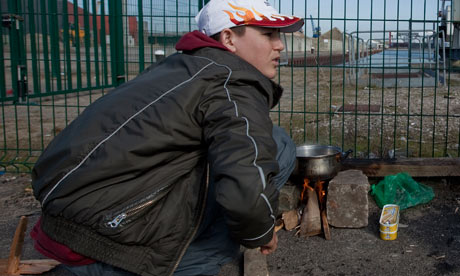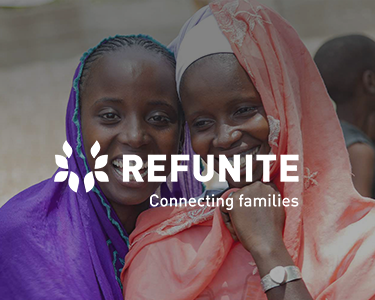
Afghan refugee Wali Allah, 13, cooking on a wood fire on the streets of Calais in France. Photograph: Sean Smith for the Guardian
A drastic increase in the number of unaccompanied minors trying to enter Europe is exposing thousands of children to severe dangers and human rights abuses, the UN Refugee Agency (UNHCR) warned today.
Following UK government plans to set up a £4m “reintegration centre” in Afghanistan so that it can deport unaccompanied child asylum seekers to Kabul from Britain, the UNHCR warned that the measures may force children to go underground, putting them in further danger as they try to avoid the authorities.
According to the report many children consider returning to their home country both a personal failure and “a betrayal of the trust and money that their families have invested in them”.
Sybella Wilkes, spokeswoman for the UNHCR in Geneva, said:
“There are already children trying to dodge the asylum system and by doing so they are putting themselves in terrible danger. These new measures could encourage them to try and stay completely under the radar and not seek the help they are entitled to. One of the boys we spoke to said he would commit suicide if he was forced to go back to Afghanistan. Others are fearful because they have been told that they will be held responsible if they go back.”.
The number of child migrants coming to the EU has boomed in the past 12 months, with more than 5,900 children arriving in the EU last year compared with 3,3380 in 2008.
Judith Kumin, UNHCR’s director for Europe, said the treatment of asylum seeking children could vary widely from country to country. “There are literally thousands of young Afghan boys on the move across Europe, often for several years and they are extremely vulnerable. They go through extraordinary suffering, and often don’t want to talk about it. We have to think how we would want our children to be treated if they found themselves in the same situation and let that guide us,” she said.
Lengthy journeys across Europe are fraught with danger and aggression, as traffickers deliberately keep children in the dark about the journey, according to the report Trees only move in the wind. Organised smugglers “maintain tight control of the children through fear and intimidation […] they confuse the children through deliberate misinformation … to convince them to continue their journey and exact the highest possible fee,” it stated.
Some children said that they were led to believe that the journey would take a matter of days and would involve air travel and taxis for most of the journey, others said they would have never have left if they had known the hazards they would face.
In Turkey, children were told to slash the sides of the craft they were in because they stood less chance of being detained if they were rescued by Greek coastguards. One child described watching 16 of the 20 people on his boat drown.
The study also suggests that smugglers deliberately split up groups of children who are travelling together “keeping the level of anxiety high, and preventing people from building up friendships and trust that might threaten the authority of the smugglers”.
Two boys, interviewed in different countries, broke down when recalling how they were forcibly separated from their brother before the crossing to Greece. They had not seen their sibling again.
A major problem facing European states is persuading children to remain under their protection. After the clearing of the “jungle” in Calais in September last year, almost all of the 90 children taken into care absconded within 24 hours, according to the report. It noted that the destruction of the notorious makeshift camp “has done little to improve the situation of migrants and asylum seekers in the town”.
Children later explained that there had been “no interpreters, no social workers and no facilities that met their needs”. Police harassment and physical violence in the port town, directed at adults and minors alike, provided a “clear signal to the young Afghans that they are not welcome and should move on,” the report said.
How children are treated by authorities can differ hugely and with significant consequences, according to Angela Le Rosi, senior policy advisor, who researched the report in Italy. She met one 15-year-old boy – who was then sleeping rough outside a train station in Rome – who showed her a copy of his detention papers, in which he was naked from the waist upwards, having been checked for diseases before filling in his papers.
“It was really quite disturbing. In some areas children are being treated in a way that authorities wouldn’t treat an adult,” she said. The youngest children she saw were in makeshift camps in the Italian capital, where she saw boys as young as nine.
“Unaccompanied minors just have to be lucky, and meet the right people with the right resources. The procedures and legislation are there but it is a lottery as to the type of care you will receive,” she added.
Immigration minister Damian Green said the government was working with other EU countries, NGOs and the Afghan government to help young people in their own countries and return those who made the trip safely. “The UK Border Agency will not return unaccompanied minors unless their families can be located or alternative support and care arrangements are put in place,” he said.
Source: The Guardian
By Alexandra Topping


